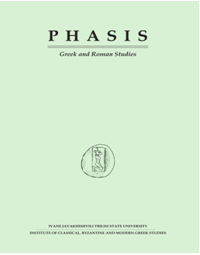Motivations for the Beheading of John the Baptist in Byzantine and Old Georgian Writings
DOI:
https://doi.org/10.60131/phasis.17.2014.1979Abstract
This paper discusses Georgian translations of the homilies on the beheading of John the Baptist as well as Georgian original writings, specifically, Ioane Bolneli’s and Sulkhan-Saba Orbeliani’s sermons and teachings. All of them rely on the story of the Gospel (Mat., 14,3; Mark., 6, 26). There are five surviving Georgian versions of Byzantine homilies dealing with the beheading of John the Baptist. They were composed by Pseudo-Chrysostom (two texts), Andrew of Crete, Theodore of Studion and John Xiphillinus, and date from the 9th to the 16th centuries. The authors foreground different aims and motivations of Herod’s crime: the king’s reluctance to break the oath and offend Herodias before his fellow dinners; the king’s feigned sorrow and malignant joy fostered by his exasperation at John the Baptist’s recurrent statement: ‚It is not lawful for thee to have thy brother’s wife‛ (Mark., 17, 18); Herodias’ guilt of marrying her husband’s brother. The medieval fathers also point out that: women are the source of evil; one must not bind oneself by oath; Herod inherited sinfulness from his father, King Herod I, who massacred infants; one sin generates another; the king was driven by voluptuousness, as he was ‚possessed by bestial lust‛ that darkened his mind. In this paper, I only dwelt on Georgian translations of Byzantine homilies. However, it should be noted that the 7th-century Georgian homilist, Ioane Bolneli and a well-known 17th-18th-century Georgian clergyman and writer, Sulkhan Saba Orbeliani considers inebriety as the main cause for beheading John the Baptist.
Downloads
Published
Issue
Section
License
Copyright (c) 2014 PHASIS

This work is licensed under a Creative Commons Attribution-NonCommercial 4.0 International License.


